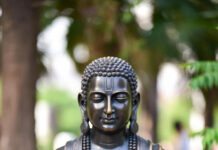 Dear Je
Dear Je
You have extensively and deeply studied Hindu wisdom traditions, philosophies, the Bhagavad Gita, the Upanishads, and many other texts, and have deep knowledge in the subtleties of temples. It’s quite surprising to know that you have no belief in God at all.
It was faith in God that motivated the creation of great temples and texts. There are many intricate, easily incomprehensible subtleties in temples. There is a subtlety where some ‘yantras’ (consecrated plates) are buried beneath the main deity such as a Shiva Lingam. Those who worship with true devotion, experience something.
In my life, I have experienced some unbelievable miracles and transformations through devotion and temples. My interest towards learning astrology also has this background. I have completely given up non-vegetarian food. By reciting the Sundara Kanda, a part of the Ramayana, I have achieved great benefits. Having been born in a Periyarite family and raised as an atheist, this transformation today is astonishing! I can claim this as a ‘medical miracle’ :).
Can you write an essay about the reason for being an atheist, despite having learned and studied this tradition, philosophy, and the teachings of great scholars, and continuing to write extensively about them? Dialectics is your favorite term! It exists in this too!!
With Love
K. R. Adhiyaman
Dear Adhiyaman
I can explain my stance on this matter in great detail. Generally, in the Tamil context, discussions related to Indian spiritual wisdom / knowledge systems have become very rare, so we tend to approach these topics with cliched or generic words.
The questions commonly asked in Tamil land are whether you are a theist or an atheist, and whether you believe in God or not. Philosophically, these are very superficial, generic questions.
Instead of answering the first question with just the two stances of theist or atheist, one should ask if there are other stances apart from these two. For the second question, one should ask, ‘What do you mean by God?
Since the Chola period, major religions have deeply rooted themselves in Tamil Nadu. The vast devotional movement (Bakthi movement) that arose alongside, has determined today’s arts, thoughts, and ways of life in Tamil Nadu. Even now, they continue to be powerful. The devotional movement (Bakthi movement) portrayed devotion itself as the sole aspect of spirituality, and shaped it in a way that it could stand within major religions.
At the very beginning of the Hindu metaphysical / spiritual knowledge tradition, we see the dichotomy of knowledge (jnana) versus action (karma). The Rigveda itself is divided into the Jnana Kanda and the Karma Kanda. The Karma Kanda contains rituals and beliefs, while Bhakti is its emotional state. The Jnana path involves reasoning and introspection to approach the truth. This debate is repeatedly explored in the Bhagavad Gita.
In all sects of Hinduism, the path of knowledge (jnana) has traditionally been considered superior to or at least equal to devotion (bhakti). However, gradually, the emphasis has shifted to devotion as the primary focus. In the hundreds of stories created by our devotional movements, we often see simple, unrefined devotion triumphing over knowledge—an example being the story of Kannappa Nayanar.
Thus, the idea emerged here that wisdom (jnana) is also a part of devotion (bhakti). The monasteries established in the name of Shankara, who advocated the pure path of wisdom, turned into institutions that promoted rituals and practices.
Therefore, the ‘God’ that believers refer to here is the conceptual God put forth by major religions [such as Saivism, Vaishnavism, Shaktam, Islam, Christianity, etc.]. It is a central form capable of creation, preservation, and destruction, the master of the universe, omniscient, and full of compassion. The question essentially means, “Do you have faith in that power?”
In reality, the concept of God is not limited to this form alone. There are more subtle and grander forms associated with this concept. The primordial divine form in the Hindu philosophical tradition, Brahman, is an even more grandiose vision. Various explanations of it abound in our tradition, but most of us are unaware of them.
The sages of the Bhakti movement glorify these great deities by referring to them as manifestations of Brahman, thus linking them with that original vision. In other words, our divine forms such as Shiva, Vishnu, and Murugan are smaller, graspable visions derived from the grand vision of Brahman.
The path of knowledge (jnana marga) operates not on the basis of faith, but on the basis of seeking. One should not ask a follower of the path of knowledge if they have faith in God. If they have faith, it means their journey on the path of knowledge has ended and they have found the answers. They are not seeking faith in God, but self-realization or self-experience.
In the Hindu tradition, there is a broad philosophical understanding that goes beyond the concept of faith in God promoted by the Bhakti movement. At its core is Vedanta, followed by Advaita. Narayana Guru is an Advaitist, and Nitya Chaitanya Yati is also an Advaitist. I am a student of the latter. Both Nitya and his teacher, Nadaraja Guru, never visited any temples or adhered to any rituals. If you had asked them if they had devotion to God, they would have answered no.
The God described by Vedanta and Advaita is not an external force that stands apart from the universe to create, sustain, and destroy it. Rather, it is that which manifests itself as both the universe and as us, in every aspect of existence. This is what is expressed in the Upanishadic statements such as “Ishavasyam idam sarvam” (All this is God), “Tat Tvam Asi” (That thou art), and “Aham Brahmasmi” (I am God).
I believe in that. It is not necessary for me to worship my God or to pray. It is enough if I can feel that infinite space-time energy in the blade of grass sprouting in my yard. Vedanta calls this realization of non-duality as true knowledge.
Buddhism presents another face of the true knowledge of Vedanta. Its concept of God is the “Mahadharma.” The flow of water and the stillness of a rock are their dharmas. This universe is composed of countless such dharmas. The totality of all these dharmas is referred to as Mahadharma. It is the cosmic order. It is not outside the universe; it exists because the universe exists, and the universe exists because it exists.
You will understand without any explanation that there is a significant difference between these divine forms and the divine forms of other religions.From the perspective of religions, this is atheism. From the perspective of atheism, this is theism. However, this is a cosmic vision that does not conflict with modern science. This was the first and central vision to emerge in Indian philosophy. For those who could not internalize it and for those who could not relate it to worldly matters, other divine visions were created.
They worship any Hindu deity in this dual aspect. They revere it simultaneously as an incomprehensible, infinite power and as a form with a specific divine image.
The simple classification of theism and atheism generally applies only to Abrahamic religions. They consider God as an external force, an entity, or a personality that creates, protects, and destroys the universe. One who believes that such a God exists is a theist. One who does not believe is an atheist. [The word “asthi” in means existence. The terms āstika & nāstika mean one who believes in existence and one who denies existence.]
The divine forms of traditions like Vedanta and Buddhism transcend these dualities. It can be said this way: You are viewing it from that side, and I am viewing it from this side. We can have a dialectical discussion of our perspectives, but no contradiction between us.
Jeyamohan
Translated By Geethaa Senthilkumar











